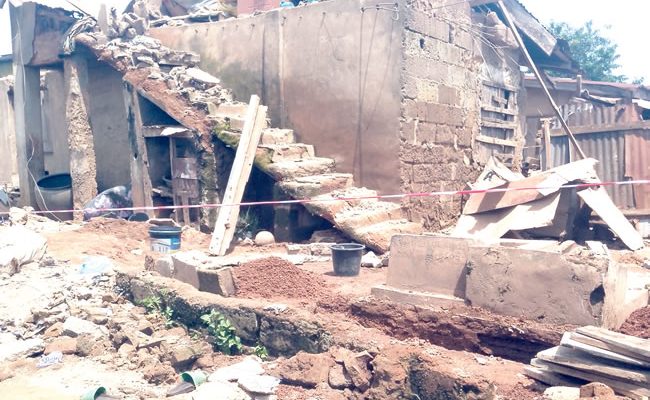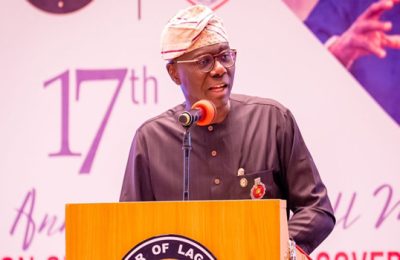As buildings continue to collapse across Nigeria, experts have once again raised human factor; flouting of building codes, use of fake, defective and substandard materials, need for stricter enforcement of professional codes and regulations to protect lives, negligence as well as incompetence and corruption as factors responsible for high rate of collapses. YEJIDE GBENGA-OGUNDARE reports that professional bodies like the Council of Registered Builders of Nigeria and Council for the Regulation of Engineering in Nigeria (COREN) have identified legislative gap in its enabling Act as a major limitation in its prosecution of owners of collapsed buildings in the country adding that government negligence in enforcing laws and regulations are a major challenges.
On Thursday, October 31, 2024, a building collapse at Yegede-Foworogun, Ibadan, in Ona-Ara Local Government Area of Oyo State claimed the lives of 10 persons while nine others sustained varying degrees of injuries during the incident. This is just one of the many cases of building collapse across the country in the last year. Indeed, according to a report by an organisation; the Building Collapse Prevention Guild (BCPG), a professional body that works to prevent the collapse of buildings and promote safe and sustainable practices nationwide, Nigeria experienced about135 incidents of building collapse and dozens of fatalities in the last two years. Indeed, it was said that as of July 2024, there was a record of at least 22 reported cases of building collapse in Nigeria and over 354 deaths resulting from 91 incidents in Lagos since 2012.
The frequent occurrence of building collapse cases in Nigeria has raised concerns about the need for stricter enforcement of professional codes and regulations to protect lives because Nigeria’s real estate industry is one of the most vibrant sectors presently despite the unfriendly economic situation in the country. Indeed, the industry had been recording growth in leaps since 2020. It has helped a lot of investors diversify and build their portfolio in line with the provisions of the 1999 Constitution of the Federal Republic of Nigeria (as amended) which guarantees the right to own property.

As vibrant as the sector is, however, the growth is being blighted by the challenge of building collapses. Though, the challenge of building collapse is not peculiar to Nigeria, the frequency and circumstance of each collapse continue to emphasise the obvious vacuum in regulatory issues and implementation of legal framework as experts to throw up certain factors such as incompetence and corruption, flouting of building codes, use of fake and substandard building materials and negligence as reasons behind regular building collapses in Nigeria.
Indeed, constant building collapse have continued to bring to the front burner of discussions, the fact that there continues to be unresolved issues plaguing the building construction section of the real estate sector in Nigeria. Indeed, experts have queried the effectiveness and adequacy of measures put in place to safeguard the life and property of citizens, especially in Lagos State where it seems building collapses are becoming a common occurrence.
Currently, buildings continue to fall like pack of cards, especially in Lagos State, reinforcing the question of whether Nigeria is behind in enacting adequate laws to regulate operations of the building sector or whether the rules are adequate but are not well implemented due to breach in implementation.

Do building regulations exist in Nigeria?
There are many regulations governing building construction in Nigeria, especially in Lagos State. At the national level, there is the National Building Code 2006 that was initiated by the National Council on Housing and Urban Development as a means of putting an end to the rising trend of constant building collapses but it has been argued that the Code is obsolete as it is only applicable in states.
There is also the Lagos State Building Regulation and Permitting Process which is put in place to implement standardised practices to ensure high level of regulatory compliance with planning and building code requirements and improve the outcome of industry practitioners’ interactions with regulatory agencies in the permitting process.
Also in Lagos, there is the Urban and Regional Planning and Development Law 2010, which was established to provide for the administration of physical planning, urban development, urban regeneration, building control and other connected purposes. It also established relevant Physical Planning and Development Agencies that would play crucial roles in the execution of the provisions of the law like the Lagos State Physical Planning Permit Authority (LASPPPA), Lagos State Urban Renewal Agency (LASURA) and the Lagos State Building Control Agency (LASBCA).
Lagos also has the Building Control and Stage Certification Process Law, the Building and Civil Engineering (Construction) Materials Quality Control Laboratory Law, the Model City Plans Approval Orders, Operative Development Plans, Operative Approval Orders on Approved Layout Plans, Lagos State Physical Permit Regulations 2019, Lagos State Building Control Agency Regulations 2019, Environmental Impact Assessment Act 1992 and Sections 64 (1) and 65 (1) of the Insurance Act.
Are there provisions for defective structures?
The law made provisions for steps to take when a structure is deemed to be defective. According to the guidelines, when a structure has been adjudged to be defective and dangerous to the public, the Building Control Agency must exercise its powers to serve owner a demolition notice which shall contain a date not later than 21 days after which the Building Control Agency shall take steps to commence demolition of the defective structure at the expiration of the time given. Also, the law mandates the owner of the structure to pay to the State Government the cost of the demolition and failure to pay the cost of the demolition shall result in such people forfeiting the property to the state government.
Are multiple laws effective?
Professionals have argued that though not perfect, the existence of myriad of building codes and regulations is enough to curb all forms of vices and building defects if not for what they describe as lack of compliance on the part of developers and non-enforcement of regulations on the part of government agencies saddled with the responsibility of monitoring construction.
They highlighted the major cause of building collapse as the obvious lack of compliance with set laws and standards in the building sector in addition to use of sub-standard materials, corruption, negligence and use of unskilled workers and quacks.
Also, some argue that the duplication of agencies dealing with different levels of the permit process may create unwanted bottlenecks, calling for collaboration and effective monitoring across all agencies.
According to Lillian Odunawo, a property consultant, “The problem is not inadequacy of relevant laws and monitoring agencies but that of ineffective enforcement of building regulations as a result of corruption and graft as well as laziness on the part of operatives of enforcement agencies coupled with ignorance and ineptitude.”
Legal implications
Based on the law, individuals and families of those who lost their lives and properties in a collapsed building would be entitled to compensation because developers are mandated under the law to obtain insurance covers as a prerequisite to getting approval for their building construction. The insurance policy would also be expected to cover third parties, consequently, a developer that complies with the provision of the law may be covered as the insurance companies with which the building was insured under normal circumstances, must have been involved in the monitoring of the construction of the building because of its obligation and likely liability.
Experts speak
The Building Collapse Prevention Guild (BCPG) in one of its reports advocated that regulators should consistently do well in ensuring that building codes are complied with, adding that professional ineptitude, including excessive loading, use of substandard materials, poor workmanship, and weak foundation contributed significantly to the collapses.
On its part, the Council for the Regulation of Engineering in Nigeria (COREN), speaking through a member of its Council Committee on Engineering Regulation, Monitoring and Enforcement, Engr. Dominic Akuboh, stated that it has identified the legislative gap in its enabling Act as a major limitation in its prosecution of owners of collapsed buildings in the country, adding that “even when you carry out an investigation and find building owners culpable, there is no clause in the COREN enabling Act that allows it to carry out any action on them though COREN has an understanding with the Independent Corrupt Practices Commission towards limiting this lacuna in some instances.”
COREN has over time, expressed concern over the frequent building collapses in the country, citing a lack of capacity to investigate and prosecute those responsible sometime last month but Akuboh stated that while the country could investigate building collapses and infrastructural failures, there was a need for clear legislation to bridge the legislative gap so that all parties are liable to prosecution without any encumbrances when found culpable.
According to him, saving lives takes precedence when incidences of building collapses occur and bulk of investigations do not directly indict engineers but rather highlight issues of quackery, use of substandard materials, and economic factors, leading to cutting corners, and corrupt and unprofessional practices.
He emphasised major issues as quackery, use of substandard material, penchant to cut corners on materials as well as professional negligence, adding that if an engineer carelessly allows their seals to fall into the wrong hands, they could be indicted in a case of building collapse.
Also, COREN President, Engr. Sadiq Abubakar had noted that “the committee will drive the Engineering Regulations Monitoring at the national level, similar to the existing practice at Regional and State levels. This will ensure effective proactive monitoring and enforcement of engineering regulations to prevent infrastructure failures in general.”
The Council of Registered Builders of Nigeria through its chairman, Samson Opaluwah, blames government negligence in enforcing laws and regulations, adding that “this collapse, unfortunately, has continued to happen, especially in areas that we can refer to as urban centres, where professionals and professionalism should be extolled to the highest.”
He called on relevant regulatory agencies to be alive to their responsibilities, emphasizing that “the challenge we have now is government enforcement of its laws. We need to punish those who have been found wanting in the past. In all the published reports and investigations done by the Federal Capital Territory (FCT), we have not seen any advertised punishment to those found wanting.”
On its part, the Nigerian Society of Structural Engineers said lack of professionalism in the industry has led to unethical dealings like the use of cheap and inferior materials, improper supervision, and distortion of original building plans, adding “as we have consistently advocated, there is an urgent need for a complete overhaul of the nation’s building and construction regulations. A policy should be put in place whereby any professional connected with a collapsed building should forfeit their license and face the full weight of the law. The land upon which the collapsed building was erected should be forfeited to the government. Buildings marked for demolition by town planning authorities should be demolished without delay. Unless drastic steps are taken and building codes implemented to the letter, the nation will continue to have these avoidable serial disasters.”
In 2020, the immediate past chairman of the Nigerian Institute of Estate Valuers and Surveyors (NIESV), Dotun Bamigbola, in an interview with Nairametrics, stated that as long as the government, both at the state and federal level, through its agencies, fail to check the trend, more non-professionals will continue to build, thus endangering the lives of Nigerians.
Speaking on the Nigerian Building Code bill, which has interestingly been with the National Assembly for 10 years at the time, Bamigbola explained that the bill’s passage will go a long way in curbing building collapse across the nation. He, however, acknowledged that the Lagos State government already has a set of building regulations that, if strictly adhered to, can prevent or limit the incidents of building collapse in the state
He added, “The problem mainly is implementation and enforcement on one part, as well as the problems of failure to use professionals and quality materials. If developers, the government and the professionals can overcome these challenges in the sector we would have a better outlook on building collapse.”
Over the years, the Nigerian Institution of Surveyors had advocated a law compelling monitoring of structures such as houses, bridges, roads at all stages of construction to avert shoddy jobs and collapses leading to loss of lives and resources, reiterating that because building collapse is always an issue, it had made recommendations to the Federal Government and Lagos State Government where building collapse usually happens, asking for a bill that will make the owners of such buildings, dams, bridges and roads to be monitored to see whether it is cracking or collapsing before it becomes a national problem, especially through the promulgation of a national bill.
“When due process is fettered, the required result might become defective. Every organised society across the world has put in place laws that would guide building construction process. The law in Nigeria has taken into consideration the importance of regulating building practice. To prevent building collapse caused by defective designs, the government initiated a building approval process that would ensure that both architectural and structural drawings are done, stamped and vetted by competent professionals, that is, architects and structural engineers,” it stated.
There was a consensus among stakeholders that lack of adherence to laid down laws by developers and the complicity of some enforcement agencies, in addition to inefficiency of operatives of the agencies, are some of the major problems experienced in the real estate industry which is responsible for building collapses and not inadequacy of regulation or enforcement provisions.
It is said that there is enough legislative framework to achieve safe and sustainable buildings in Nigeria in general and Lagos State in particular but the will to comply with the provisions of the relevant laws by all stakeholders in the building industry and enforce the laws by the government is the challenge.
READ ALSO: Ondo guber: We’ll be transparent in distribution, inspection of sensitive materials — INEC







